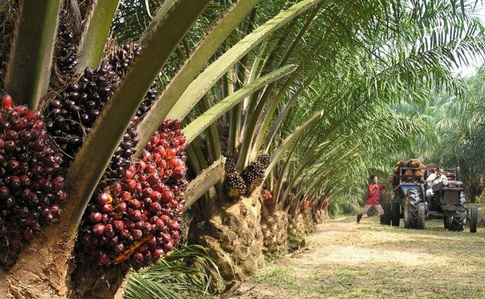
Dangerous only Ukrainian? Why the EU does not prohibit palm oil
TUESDAY, 22 MAY 2018, 08:45 — ALEXANDER BALDYNYUK, OLEG SHVETS

Parliament adopted in first reading a bill banning the use of palm oil in food production. 233 MPs voted for the bill, and no MP voted against not. And despite the fact, the two committees of Parliament actually gave a negative opinion on the bill, as well as scientific and expert management of Parliament.
What is behind this decision? very similar, that the motives of the deputies were formed false stereotypes about “trees”, which generally, Unfortunately, shared by most Ukrainian.
But if some MPs, while a captive of stereotypes, guided full purpose to protect public health, then persistent rejection of palm fats other MPs, have been informed in detail by experts about the real impact “trees” human health, explained ordinary populism.
Let's see, or is actually harmful palm oil, and go through the main myths surrounding this issue.
Myth 1. Lobbyists claim the ban palm oil, though scientists proved harmful “trees”, and therefore it seemed forbidding to many developed countries.
In fact it is - an outright lie. No country in the world there is no ban on the use of “trees” in food.
Vice versa, Safety palm oil confirmed its long-term use and GRAS status (“perfectly safe”) American agency FDA (Food and Drug Administration).
“Palm” also listed 17 types of vegetable oils, responsible food standards FAO and WHO, according to the Codex Alimentarius, The World Trade Organization is considering as a leading food standard.
Interesting fact: EU population consumes 2,7 million tonnes of palm oil annually, or average - 5,4 kg per person.
And in the leading EU countries this figure is much higher. For example, Germany, of Denmark, It is about Sweden 14 kg / year. However, the average annual consumption of palm oil per capita in Ukraine is only 3,1 kg / year.
Scientific research, made in accordance with modern standards of evidence, not confirm the negative impact of consumption of palm oil on human health, including increased risk of cardiovascular disease. No reasonable grounds for believing palm oil more dangerous compared to other fats.
The advantage of using palm oil - the balanced composition of fatty acids: 50% saturated, 40% and monounsaturated 10% polyunsaturated fatty acids. Polyunsaturated fatty acids have a positive influence on metabolism, including at the cellular level. Protects cells from premature aging, help keep their genetic information.
Another fact, which makes another estimate “palm tree”: Leading global manufacturers produce food for infants, who for various reasons are deprived of mother's milk, It is based on palm oil, which is well absorbed by the child's body.
Medical debate on “trees” the world is part of the debate on the optimal amount of fat, which consumes a person, but not harmful palm oil.
As is the case with many products, not the most damaging oil, and the surplus.
How, then, did the thesis of damage “trees”? In fact, here in our legislators, and the majority of citizens, a situation “heard the bell, and I do not know, where he”.
Damage to health can not be found in “palm”, and the so-called fatty acids transizomerah, or, as they are called in the people, transjirakh. That Trans fats consumption, but not “trees”, restricted in many countries, including in some EU countries. Samye transjiri, but not “palm”, disrupts enzyme and reduce human immunity. Samye transjiri, but not “palm”, increase blood levels of cholesterol and the risk of atherosclerosis.
Where did come from Trans fats?
The fact, Some oils - sunflower, soybean, rapeseed - are a natural liquid. But for the many needs of the food industry and must transfer from the liquid state of plastic. It is clear, because with liquid oils do not, example, margarine or other finished products. They just do not pile trymatymutsya.
For solid plastic fat liquid vegetable oils are usually subjected to additional physical and chemical treatment - partial hydrogenation.
The disadvantage of hydrogenation process is the formation of Trans fats, which are alien to the human body.
It is, Trans fats that increase cholesterol blood levels, disrupts enzyme, reduce human immunity, and their regular consumption is associated with the risk of dangerous diseases, especially cardiovascular.
In many EU countries transizomeriv content is limited at 2%.
But palm oil fractions, including, palm olein and superoleyin, Unlike liquid oils, There are the nature of the desired plastic, structure and soft texture. Therefore, they do not need to expose hydrogenation. Therefore, “palm” no Trans fats.
More, without palm oil to produce complex specialized confectionary fats, margarine, etc., which would not contain harmful Trans fats, almost impossible.
That sad irony named Lyashko bill is so, what, putting safe “palm tree” Outlaw, Ukrainian lawmakers condemn eat Trans fats are dangerous.
Myth 2. In the case of palm oil ban in food production it without any problems can be replaced other oils.
It is not true.
World production of vegetable oils is approximately 198 million tons per year. Of these, almost 70 million tons - this is palm oil. That is more 35% total production of oil. The same ratio - more than a third - consumption “trees” of the total consumption of vegetable fats observed in Ukraine.
None of vegetable oils in the world is produced in quantity, necessary to replace palm oil.
Theoretically, the producer might try to replace “palm tree” rape and sunflower.
But this culture is difficult to produce in sufficient quantities, which would satisfy the existing demand for food. To produce the same amount of oil, what makes one hectare palm, need six hectares of rape, 8 hectares of sunflowers or 10 hectares of soybeans.
To meet the needs fats need to use huge agricultural area, leading to unpredictable environmental and social impacts.
That is, if suddenly will become effective ban on “palm tree”, displace it to other fat can not be - simply nowhere to take other fats in the right amounts. This will lead to the collapse of the food industry.
Again, do not forget, that replaced “palm tree” sunflower or rapeseed, we have to get them hidrohenizuvaty Trans fats.
Myth 3. “Palm” - tugoplavka, because the body can not properly digest it.
Regarding refractoriness, it is only partly true, because different fractions of palm oil have different melting point:
– palm olein - 18-24 ° C,
– Palm superoleyin - 7-12 ° C,
– palm stearin - 47-55 ° C.
Apparently, most food factions “trees” having a melting point, lower the temperature of the human body.
But really it does not matter, since oil, as well as other food products, do not melt in the human body, and digested. We do not think the question, in which melts cucumber or apple.
And another question: which is popular fat remains solid in your hands? Right, fat. Do not be afraid of fat? For Ukrainian - a rhetorical question.
For a number of physical and chemical properties of palm oil is similar to animal fats - butter and bacon. These foods we digest properly, The same can be said for palm oil.
Myth 4. Disabling “palm tree”, then it will no longer be added to dairy products.
In fact, add vegetable fats (not only “palm tree”) in traditional dairy products, which should contain only milk fat, can not now.
If some unscrupulous manufacturers falsify such products, it is a problem “trees”, and state control.
At present, responsibility for counterfeit products is high enough, and accredited laboratories have all possibilities to carry out the relevant tests. The state has the authority to restore order in this area, you only need to use them.
Myth 5. “Palm” - a cheap substitute “normal fat”, including vegetable oil, so manufacturers are actively using it.
In fact, crude palm oil is traded on world markets for almost the same price, that sunflower oil. Some factions nyzkoplavki “trees”, of which are made in including. cocoa butter equivalents, is quite expensive. more expensive, than butter.
* * * * *
Did all these facts people's representatives, who voted for the bill against palm oil? At least the authors of this initiative - known.
Now will know other. And before the imposition of the bill on second reading, each will have a choice: walk on a leash in the populists, playing on false stereotypes, or take a responsible stance and prevent the destruction of food production in Ukraine.
Publications section “Expert opinion” non-editorial articles and reflect only the views of the author
 ALEXANDER BALDYNYUK ALEXANDER BALDYNYUK
President of the Association “Ukrkondprom” |
|
 OLEG SHVETS OLEG SHVETS
Chairman of the Association nutritionists Ukraine |


Leave a Reply